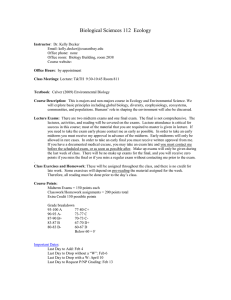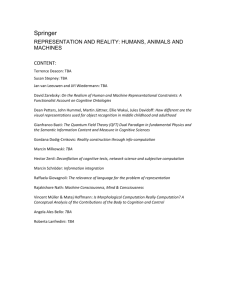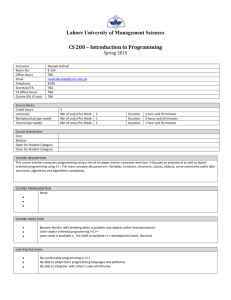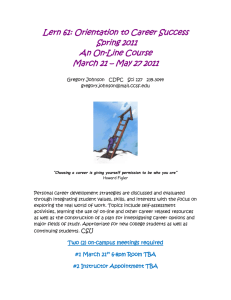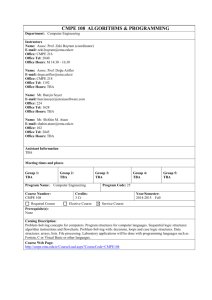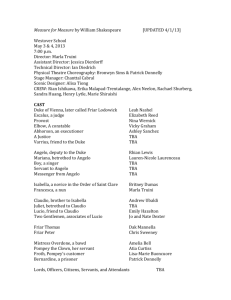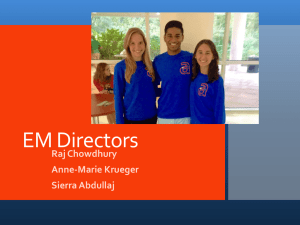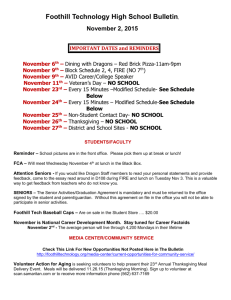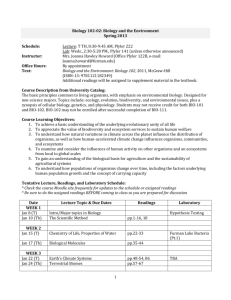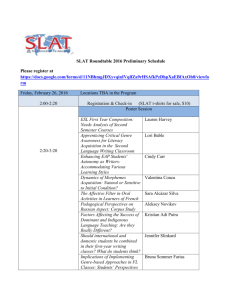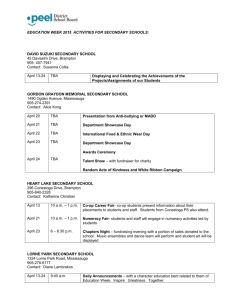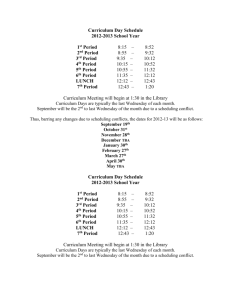Biological Sciences 110
advertisement
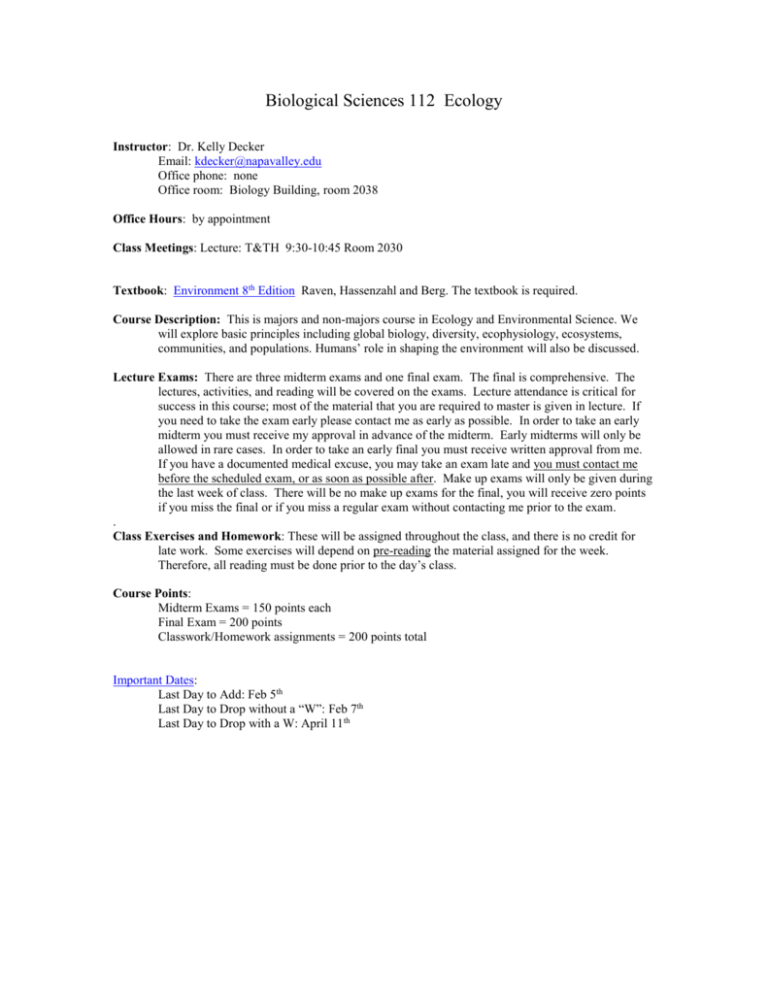
Biological Sciences 112 Ecology Instructor: Dr. Kelly Decker Email: kdecker@napavalley.edu Office phone: none Office room: Biology Building, room 2038 Office Hours: by appointment Class Meetings: Lecture: T&TH 9:30-10:45 Room 2030 Textbook: Environment 8th Edition Raven, Hassenzahl and Berg. The textbook is required. Course Description: This is majors and non-majors course in Ecology and Environmental Science. We will explore basic principles including global biology, diversity, ecophysiology, ecosystems, communities, and populations. Humans’ role in shaping the environment will also be discussed. Lecture Exams: There are three midterm exams and one final exam. The final is comprehensive. The lectures, activities, and reading will be covered on the exams. Lecture attendance is critical for success in this course; most of the material that you are required to master is given in lecture. If you need to take the exam early please contact me as early as possible. In order to take an early midterm you must receive my approval in advance of the midterm. Early midterms will only be allowed in rare cases. In order to take an early final you must receive written approval from me. If you have a documented medical excuse, you may take an exam late and you must contact me before the scheduled exam, or as soon as possible after. Make up exams will only be given during the last week of class. There will be no make up exams for the final, you will receive zero points if you miss the final or if you miss a regular exam without contacting me prior to the exam. . Class Exercises and Homework: These will be assigned throughout the class, and there is no credit for late work. Some exercises will depend on pre-reading the material assigned for the week. Therefore, all reading must be done prior to the day’s class. Course Points: Midterm Exams = 150 points each Final Exam = 200 points Classwork/Homework assignments = 200 points total Important Dates: Last Day to Add: Feb 5th Last Day to Drop without a “W”: Feb 7th Last Day to Drop with a W: April 11th Students in need of accommodations in the college learning environment: Any student who feels s/he may need an accommodation based on the impact of a learning disability should contact Learning Services in the Library and Learning Resource Center (LLRC), room 1766, phone (707) 256-7442. A Learning Disability Specialist will review your needs and determine appropriate accommodations. If you need accommodations for physical or other types of disabilities, schedule an appointment with DSPS Counselor, Sheryl Fernandez, in the Counseling Department located in the 1300 building, phone (707) 2567234 for appointment. All information and documentation is confidential. Please feel encouraged to make an appointment with me privately to discuss your specific learning needs in my class. Academic Honesty and Student Code of Conduct and college policies: Refer to the Catalog for a full explanation, the following is an excerpt from the catalog It is expected that a student’s academic work be of his/her own making, failure to abide by this standard of conduct is considered to be academic dishonesty. Types of Academic Dishonesty include: Copying from others on a quiz, examination, or assignment (“cheating”), allowing another student to copy one’s work on a quiz, exam, or assignment, having others take any exam instead of taking the exam oneself, giving other students information that allows the student an undeserved advantage on an exam, such as telling a peer what to expect on a make-up exam or prepping a student for a test in another section of the same class If a student cheats (for example: copies the answers from another student or has notes during the exam, has a cell phone during the exam, changes answers on a scantron after they have been graded, retaining or copying exam questions) they will receive a zero for the exam and your name will be forwarded to the Vice President of Student Services. A second act of academic dishonesty will result in a zero for the course. I consider lying to be an act of academic dishonesty. Cell phones must be turned off and left in the front of the classroom during the exam. No notes will be brought to your desk while taking the exam. All phones, bags, packs, notes, jackets, and hats will be left at the front of the room. If you have any notes, books or cell phones with you while taking the exam you will receive a zero for the exam. You may not leave and re-enter the exam in progress. Plagarism is a form of cheating, if you copy information from the internet, books, friends, etc and use it as your own work in a report, you will receive zero points. Appropriate behavior in class: For the consideration of your fellow classmates, please turn off your cell phones during class and exams. Please refrain from talking during class, if you have a question during class, please raise your hand and ask the instructor. Come to class on time. Student Learning Outcomes 1. Demonstrate skills in analysis through writing, exams, and group work in the classroom and in field work. 2. Demonstrate a proficiency of knowledge in ecology and environmental biology. Course Objectives Upon completion of this course, the student will be able to: 1. 2. 3. 4. 5. 6. 7. Understand that evolution is the outcome of abiotic and biotic selective factors that result in various physiological, behavioral, morphological, developmental adaptations. Understand how these adaptations are always aiming at a moving target, because those abiotic and biotic factors are constantly changing. Know the major terrestrial and aquatic biomes on earth and what abiotic and biotic processes dominate in them. Understand structural and functional aspects of ecosystems, especially our local ecosystems. Learn and understand the major impacts of humans on the environment: climate change, extinction, habitat loss, pollution. Understand the natural tension between the human biological imperative for growth and sustainability. Understand the basic principles of population, community, and ecosystem ecology Biological Sciences 112 Week starting: Jan 23 Jan 28-30 Feb 4-6 Feb 4-6 Feb 11-13 Feb 18-20 Feb 25-27 Mar 4-6 Mar 11-13 Mar 18-20 Mar 25-27 Apr 1-3 Apr 8-10 Apr 15-17 Apr 22-24 Apr 29-May 1 May 6-8 May 13-15 May 20-22 May 29 Lecture Topic Introduction to course Natural selection and adaptation Adapting to the environment/ecophysiology Global Biology/ terrestrial biomes Terrestrial biomes Freshwater/brackish biomes Exam 1; Marine biomes Populations Communities Ecosystems Spring Break Ecosystems Exam 2; Environmental Science Human populations, agriculture Urbanization; Toxicology Pollution Climate Change Exam 3; Diversity Diversity, Sustainability Final Exam Pre- Reading Exercise/Exam/Prep 85-89 TBA TBA TBA 113-123 Ch 14,17 124-130; ch 13 130-138; 386-392 85-95 96-106 Ch3 TBA TBA TBA Exam 1 TBA TBA TBA Ch4 Ch 1-2 Ch 8, 370-386 Ch 9,7 Ch 19,21,23 Ch 20 Ch 16 Ch 16,24 TBA Exam 2 TBA TBA TBA TBA TBA TBA FINAL EXAM
